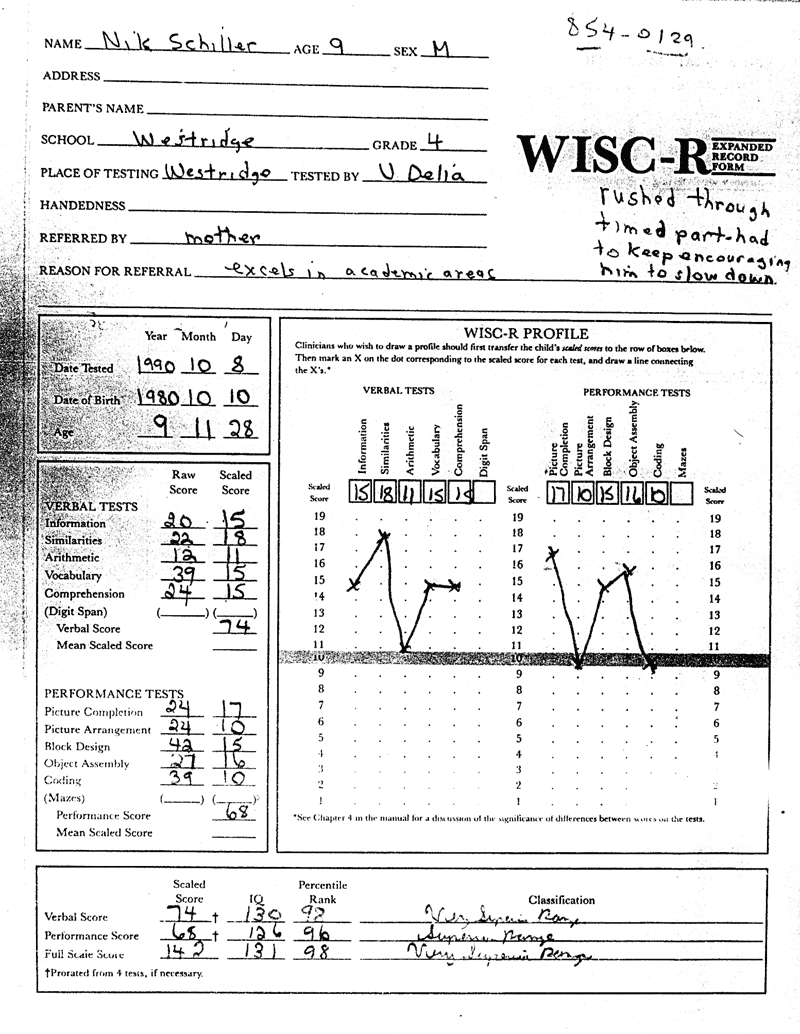
A couple months ago I got the wild idea to contact my old public school district and ask for a copy of my permanent records. I was curious about what files they had on me and if there was anything in my permanent records that was worthy keeping or sharing. To my surprise (and simultaneous dismay), I found that they had kept my intelligence quotient score (above) in my permanent file.
At the beginning of my 4th grade school year, my mom had suggested that I take the school administered IQ test so that I might be able to qualify for the school district’s Talented And Gifted Program (TAG). The special program was for students who had an IQ above 130 and had scored well in standardized tests so that they could be provided a more robust public school education. So two days before I turned 10 years old I took the exam with Ms. Delia, the elementary school’s counselor. She had platinum blonde hair, a perpetual suntan, and would always wear funky, multicolored dresses. I still remember her generous smile and supportive words that she’d always offer me during my six years of elementary school.
The test that I took was the revised edition of the Wechsler Intelligence Scale for Children. According to her written note in the margin of the results, I hurried through the exam. I don’t remember if it was because I was a little cocky 9-year-old who thought he knew it all or if I was nervous about how my scores would turn out or if it was some latent ADHD symptoms that were never fully addressed. My guess is that it was a combination of all three. Regardless of my possibly reckless speed, the final result was that my IQ score was 131, which was one IQ point higher than I needed in order to be allowed into the TAG program.
From fourth grade until sixth grade, one day each week I was bused out to the TAG center to take “enrichment” classes. It was here where I first learned how to program in BASIC, where I surfed the internet for the first time, created my first pinhole camera, and even where broke my right arm. I look back at this part of my public school education very fondly and believe that it helped shape me in ways that I’ll never fully comprehend.
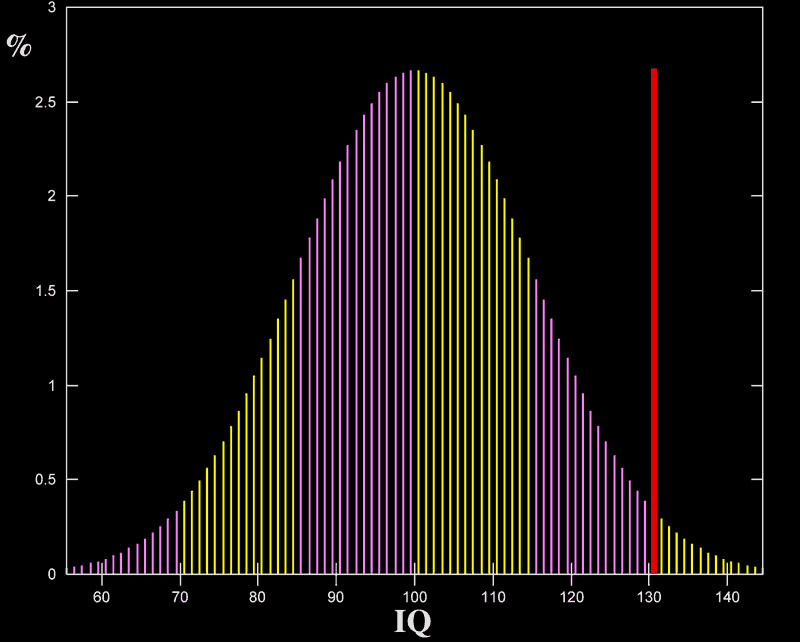
However, I am posting this discussion today because I am curious about how much my intelligence quotient has changed over years. If I were to take the Wechsler Adult Intelligence Scale, how would I fare? Would my IQ be very much different today than it was nearly 20 years ago? Would I be less intelligent, more intelligent, or about the same? What if I took a different IQ test like the Stanford-Binet? What good would it do for me to know this information at 28 years of age? Does it even matter???
I’ve always had some persistent issues knowing that my IQ placed me into the top 2% of the population. As in, if I was in a crowd of 100 randomly selected people, this IQ score would statistically make me the second smartest person in the crowd. But so what? Innate intellect does not automatically get you the job you want or even help you obtain friends or get you a college degree or even lead the crowd of 99 others to safety. It’s just an arbitrary number, right? I don’t have any intention of joining MENSA because I could really care less about belonging to a group of people that theoretically pride themselves enough to join an organization simply based on their score on a standardized test.
The beauty of this blog, which is now over 5 years old, is that I have a digital repository for documenting & sharing what my intellect has helped me accomplish. I take solace knowing that an IQ is not simply an arbitrary number that can differentiate someone from others, but rather, its their actions and creations that set them apart.






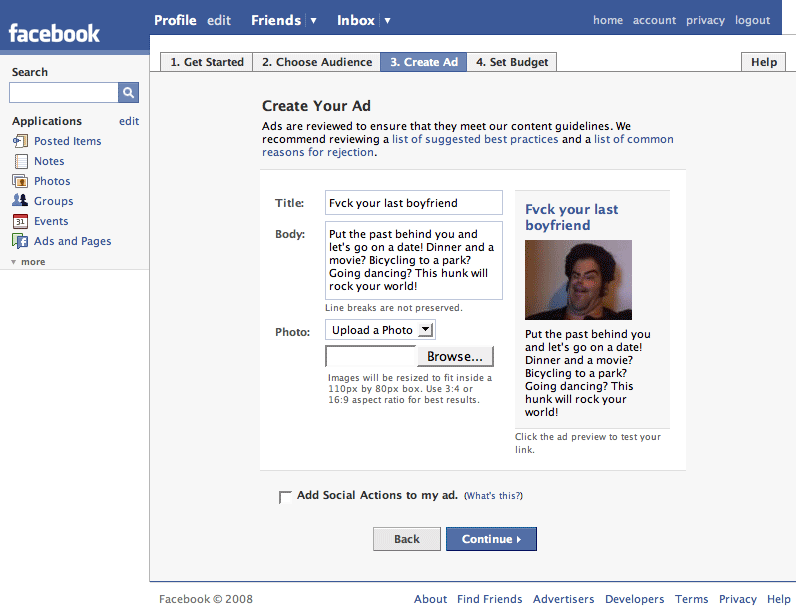


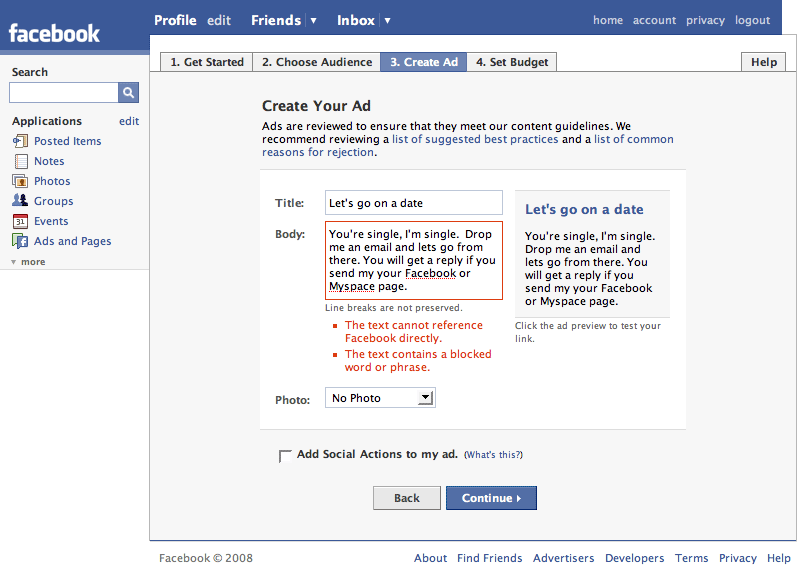
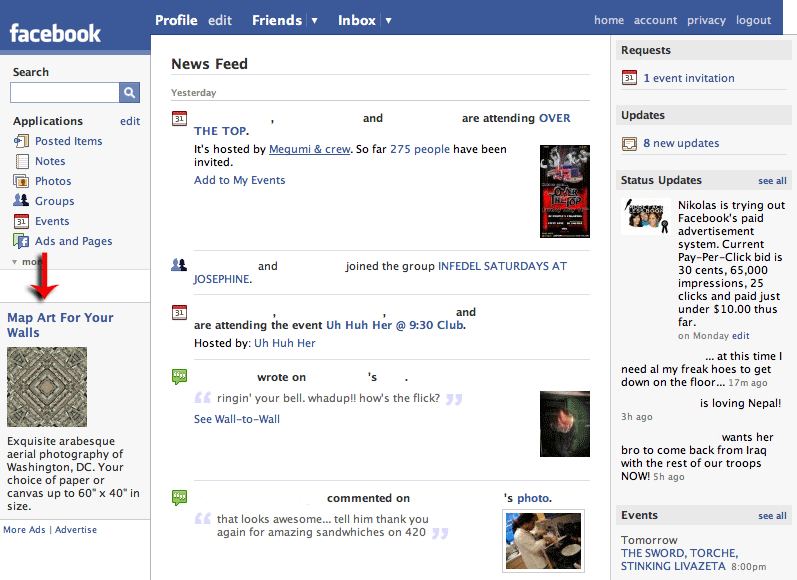
















A Response to Doug Feaver’s “Listening to the Dot-Commenters”
|| 4/10/2009 || 8:01 am || 1 Comment Rendered || ||
In yesterday’s Opinions section in the Washington Post I came across Doug Feaver’s article called “Listening to the Dot-Commenters” and felt compelled to write this missive concerning his incomplete analysis of anonymous commenters on the Washington Post website.
He writes:
He goes on to defend the commenters because they add dynamic content to an article, can be entertaining, act as a non-scientific survey on the topic de jour, and oftentimes show that the readers do not necessarily agree with the journalist who wrote the article. While these are all factual points, Feaver misses the larger issue. Comments are not completely anonymous.
Of the 330 comments that were generated by the article at the time of this posting, only one commenter addresses the larger point that I am attempting to make.
Lets take this commenter’s summarized point one step further. Since all traffic on all websites leave a digital footprint that can be tracked back, in real time, to a unique IP address or Internet Service Provider, why does the Washington Post continue to shield it’s readers from one of the most important & least invasive aspects of this harvested data: the commenter’s geographic location??
Unlike the New York Times, Wall Street Journal, or USA Today, as a newspaper of record that does not have nationwide circulation, the Washington Post’s existence and continued success is contingent upon a large local subscriber base and those living outside of the current distribution area reading articles on-line. Each month I pay to have the paper delivered to my house, but am essentially given no extra privileges when reading or commenting on an on-line article. Alternatively, each on-line article that non-subscribers read also helps the Washington Post’s bottom line through on-line advertising. Yet all commenters, paying subscribers and non-paying readers, are given the exact same treatment in the comments section of the Washington Post website. I feel this is unfair, unwise, and only perpetuates ignorant, racist, and bigoted remarks.
The incorporation of the geographic location of commenters might not seem significant, but the implications are quite important to the general discourse. When I read an article about the unconstitutional D.C. voting rights bill (aka the 1/3 Compromise), I sometimes like to see what comments are being left on-line or if someone expresses a legal opinion that I have not read yet. However after I have read what the different commenters have written, I am generally saddened that local opinions are sometimes lost in the clutter of non-local opinions. While the Washington Post knows the approximate location of each “anonymous” commenter, this information is not disclosed to other commenters, and it creates & perpetuates a vacuum of ignorance.
But its not just an issue of liking or disliking comments; I can always choose not to read them. The root of the issue is that the Washington Post is perpetuating this type of ignorance by shielding their on-line readers from where a comment is originating. This data is collected the moment a user begins loading content from the website and it does not personally identify any readers. While an IP address can be spoofed, most people are not going to take the time to put forth the extra effort just so they can prevent their approximate location from being revealed.
Commenters can still be anonymous and have a geographic location attached to them. For example, my current IP address only shows that I am a Comcast subscriber based in Washington, DC. With thousands of other Comcast subscribers, I still retain a level of anonymity by creating an “anonymous” account using a different e-mail address and creating a screen name that only I know of.
Imagine for a moment that immediately after the commenters screen name there was the text “from [LOCATION]” or as it would read on the screen: ANONYMOUS COMMENTER from Memphis, Tennessee or Nik Schiller from Washington, DC. Who would you be more likely to read if the article was about something in Washington, DC? Or Memphis, Tennessee? Esssentially, what comments have more credibility? Those comments originating from the geographic location of the subject of the article? Or those that do not?
Well, of course, it depends on the context of their comments. If they were bashing the residents of Washington, DC and do not live here, I would most likely ignore them. But as it is now, even though the Washington Post knows where the commenter is from, all other commenters are denied this basic level of geographic understanding and it alienates readers who actually pay for the newspaper.
In conclusion, I believe a more civilized level of discourse can be established if the level of anonymity is slightly altered by providing the geographic location of all commenters. Its not so much about WHO the commenter is, but WHERE the commenter is from that is at the core my logic. Locals commenting about local affairs will be treated with more respect, while people who don’t pay for the paper, leave absurd, racist, or sexist comments, can & will be ignored more easily. As a paying subscriber, I feel it’s the least the Washington Post can do to encourage my on-line participation. The current model is a free for all that can be more civil, if, and only if, the Washington Post chooses to bring more sunshine to their paying & non-paying readers through the visible disclosure of the geographic information that each on-line reader already provides.